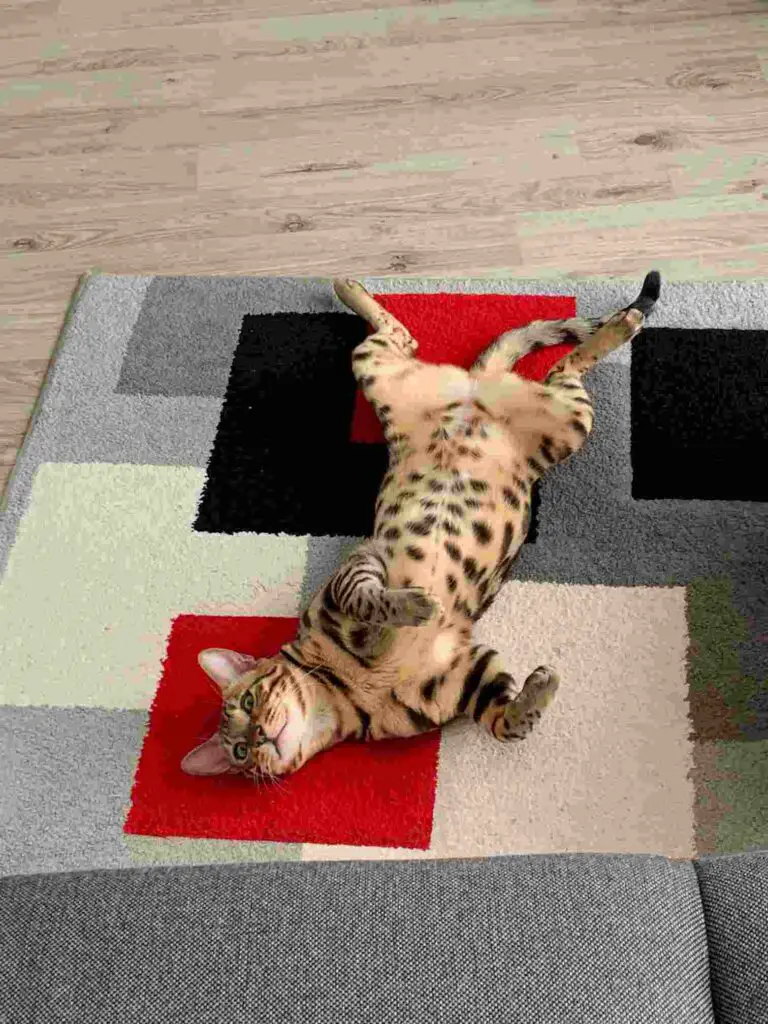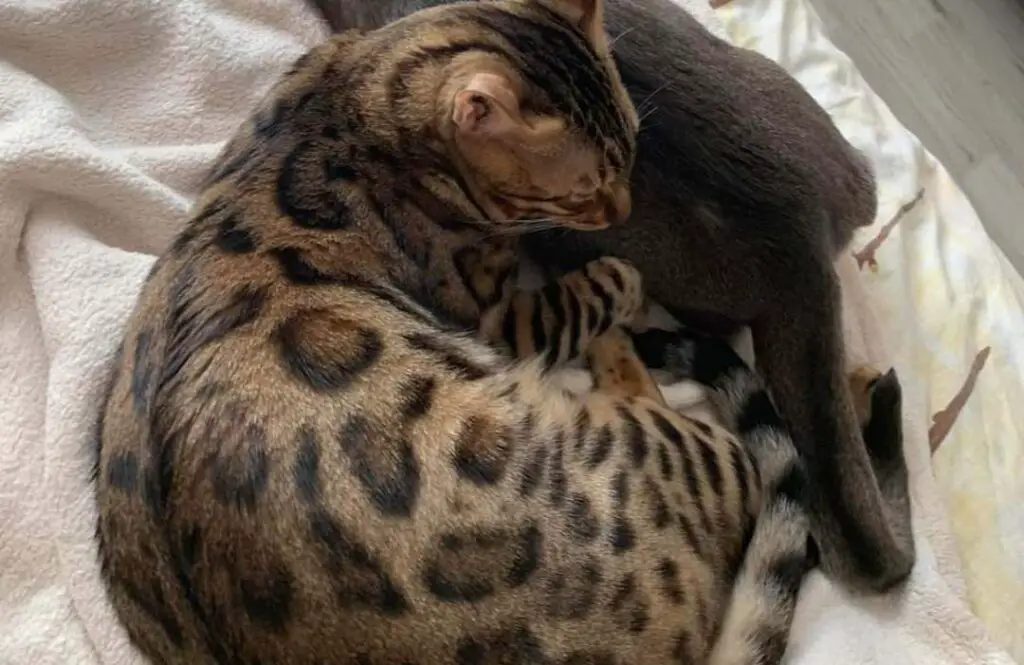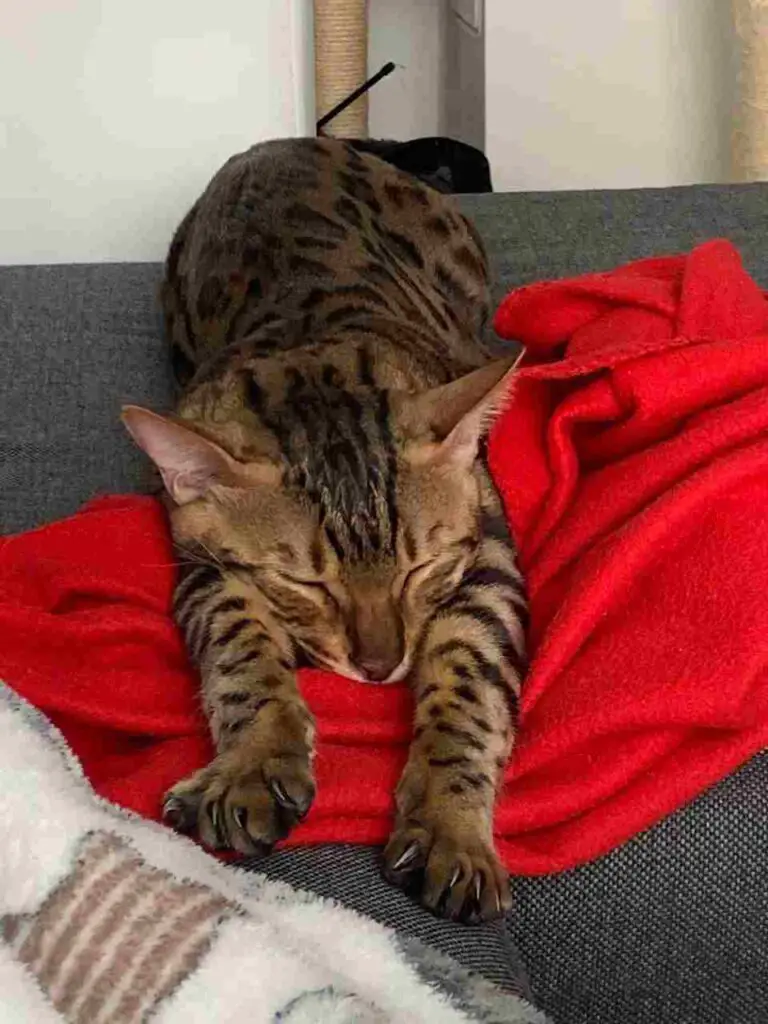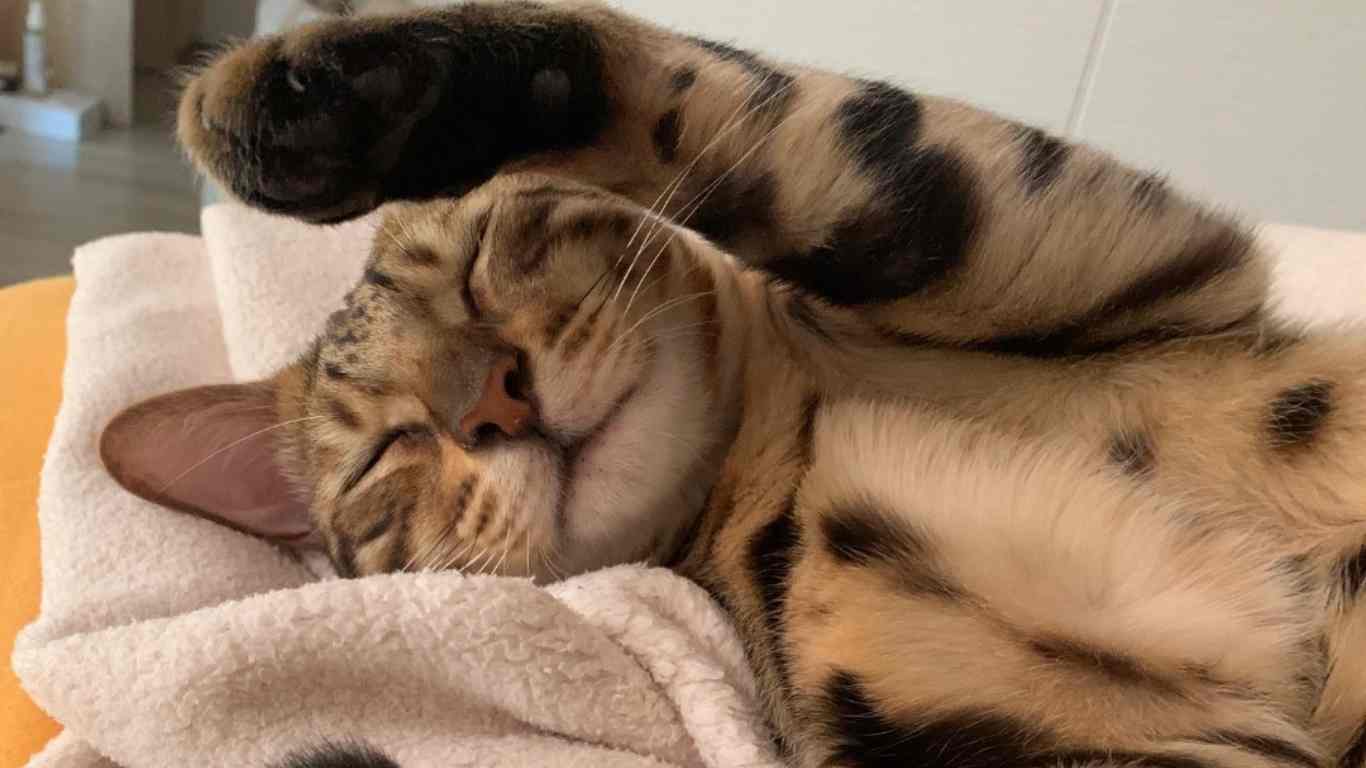Have you ever wondered why Bengal cats have such unique sleeping habits? Well, let me tell you, these adorable felines are known for their quirky snoozing routines.
From snoozing upside down to claiming your pillow as their own, Bengal cats sure know how to keep their humans entertained even in their sleep.
Stay tuned as we dive into the fascinating world of Bengal cat sleeping habits and uncover the secrets behind their purrfectly adorable slumber sessions.
Let’s start with a common question…
How long should a Bengal cat sleep?
Bengal cats typically sleep around 12–16 hours per day, with Bengal kittens sleeping up to 18 hours.
The amount of sleep can vary depending on the individual cat and their energy levels.
Bengal cat sleeping habits
Bengal cats, known for their striking appearance, have intriguing sleeping habits.
These feline beauties usually sleep for around 12 to 16 hours a day, similar to other domestic cats.
However, what makes them unique is their preference for high perches and cozy hideaways.
You’ll often find them curled up on top of bookshelves or in snug corners, embracing their wild instincts.
So, don’t be surprised if you catch your Bengal cat napping in unexpected places, as they love their beauty sleep in style!
They are highly active during the day, but they tend to be more nocturnal, preferring to sleep during the night.
However, they can adapt to their human’s schedule and may adjust their sleeping patterns accordingly.
Benefits of Quality Sleep for Bengal Cats

Quality sleep is essential for Bengal cats, providing numerous benefits for their overall well-being.
Firstly, it promotes physical and mental rejuvenation, allowing them to recharge their energy levels and stay active during their waking hours.
Adequate sleep also supports a healthy immune system, helping to ward off illness and keep them in optimal health.
Furthermore, quality sleep aids in maintaining a healthy weight and metabolism, preventing issues such as obesity.
Additionally, it promotes cognitive function and learning, enabling Bengals to process information and develop their problem-solving skills.
Lastly, quality sleep fosters emotional balance, reducing stress and anxiety, and promoting a calm and contented demeanor.
Bengal Cats Bed Preferences For Sleeping
Bengal cats have unique bed preferences when it comes to sleeping.
They tend to prefer beds that provide plenty of space for them to stretch out and move around comfortably.
Soft and plush beds with cushioning are often their top choice, offering them a cozy and luxurious sleeping experience.
Some Bengal cats also enjoy beds with raised edges or walls, which provide a sense of security and make them feel protected while they sleep.
It’s important to note that Bengal cats are known for their love of climbing, so incorporating elevated platforms or beds with vertical options can also be a great addition to their sleeping area.
Lastly, providing a variety of bed options, such as hammocks or heated beds, allows them to choose based on their mood and individual preferences.
Bengal Cat Sleeping Patterns
Bengal cats are known for their unique and fascinating sleeping patterns.
These playful felines have a tendency to sleep in short bursts throughout the day and night.
They are crepuscular, meaning they are most active during dawn and dusk.
Bengal cats are highly energetic, so they often engage in intense play sessions, followed by a quick power nap.
Their sleeping patterns are adaptive and can vary depending on their environment and daily activities.
It’s not uncommon to find them curled up in unusual spots, like on top of a bookshelf or in a cozy nook.
With their wild ancestry, Bengal cats retain some of the sleeping habits of their wild relatives, making their sleep patterns intriguing and unpredictable.
Signs of Healthy Sleep in Bengal Cats

Bengal cats exhibit several signs of healthy sleep. Firstly, they have a consistent and regular sleep pattern, typically sleeping for 12-16 hours a day.
Secondly, during their sleep, they appear relaxed and at ease, with no signs of restlessness or discomfort.
Thirdly, their breathing remains steady and regular, without any noticeable pauses or irregularities.
Fourthly, their sleep is deep and uninterrupted, with minimal waking or movement.
Finally, upon waking, they display alertness and energy, ready to engage in play and daily activities.
Factors Influencing Bengal Cat Sleeping Habits
Here are some of the most common factors influencing Bengal cat sleeping habits:
1. Environment: The environment plays a crucial role in a Bengal cat’s sleep. Providing a calm and comfortable space for them to rest is essential. Ensure that their sleeping area is quiet, away from any potential disturbances, and well-ventilated. Creating a cozy spot with a soft bed or blanket can also help them feel secure and relaxed.
2. Activity level: Bengal cats are known for their high energy levels. Engaging them in regular play sessions and providing enough physical and mental stimulation during the day can help tire them out, making it easier for them to fall asleep at night. Interactive toys, scratching posts, and puzzle feeders can keep them entertained and mentally stimulated.
3. Routine: Establishing a consistent routine for feeding, playtime, and sleep can help regulate a Bengal cat’s sleeping habits. Cats are creatures of habit, and having a predictable schedule can signal to them when it’s time to wind down and sleep. Stick to a regular bedtime routine, including calming activities like gentle petting or brushing, to help them relax before sleep.
4. Comfort: Ensuring that your Bengal cat is comfortable while sleeping is important. Make sure they have access to a warm and cozy sleeping area, away from drafts or cold surfaces. Providing a designated sleeping spot, like a cat bed or a comfortable piece of furniture, can help them feel secure and encourage better sleep.
5. Stress and anxiety: Bengal cats can be sensitive to changes in their environment or routine, which can lead to stress and disrupted sleep. Minimizing potential stressors, such as loud noises or sudden changes in the household, can help them feel more at ease. Additionally, using calming techniques like pheromone diffusers or playing soothing music can help create a relaxing atmosphere for sleep.
6. Physical Health: A cat’s sleeping habits can be influenced by their overall physical health. If your Bengal cat is experiencing discomfort or pain, it may affect their ability to rest peacefully. Regular veterinary check-ups are essential to address any underlying health issues. Ensure they have a balanced diet, regular exercise, and access to fresh water. If you notice any changes in their sleep patterns, consult a veterinarian to rule out any underlying health concerns.
Sleep-related Issues in Bengal Cats

Here are some common sleep-related problems that Bengal cats may experience and how to address them:
1. Insomnia: Bengal cats, with their active and curious nature, may struggle with insomnia. To help them sleep better, create a calm and comfortable environment in their sleeping area.
Provide a cozy bed, ensure the room is dark and quiet, and establish a consistent bedtime routine. Engaging them in play and exercise during the day can also tire them out, making it easier for them to fall asleep.
2. Nighttime activity: Bengal cats are known to be more active during the night, which can disrupt their sleep patterns. Encourage daytime activities, such as interactive play sessions and puzzle toys, to keep them engaged and stimulated.
Consider providing a scratching post or a climbing tree to satisfy their natural instincts. Additionally, establish a routine that includes interactive playtime before bedtime to help them wind down.
3. Restless sleep: Some Bengal cats may experience restless sleep, characterized by frequent movements or vocalizations during the night. Ensure that their sleeping area is free from distractions and discomfort.
Consider using white noise machines or calming scents, like lavender, to create a soothing environment.
If the issue persists, consult a veterinarian to rule out any underlying health concerns or seek guidance on behavioral modification techniques.
Conclusion
In conclusion, Bengal cats have some fascinating sleeping habits that make them truly unique companions. From their preference for cozy spots to their love for curling up with their favorite humans, these feline friends know how to sleep in style. So, next time you see your Bengal cat catching some Z’s, remember to cherish those peaceful moments and let them dream away in their own purrfect way.
Find out more about identifying a sick Bengal cat.
Frequently Asked Questions
Let’s look at some questions and answers:
How much do Bengal cats sleep?
Bengal cats are like any other domestic cat when it comes to their sleeping habits. On average, adult Bengal cats tend to sleep around 12 to 16 hours a day. However, it’s important to note that each cat is unique, and their sleep patterns can vary. Some Bengals may sleep more, especially if they are older or have a more relaxed lifestyle, while others may be more active and sleep slightly less. Just like humans, Bengal cats also have their own preferences when it comes to sleep, so don’t be surprised if your furry friend has their own schedule!
Do Bengal cats have any specific sleeping preferences?
Yes, Bengal cats can have specific sleeping preferences. Many Bengal cat owners have observed that their feline friends enjoy finding cozy spots to curl up and sleep. Some Bengals may prefer to sleep in high places, such as on top of shelves or cat trees, as they have a natural inclination to climb. Providing them with perches or comfortable elevated beds can satisfy their desire for height. Additionally, Bengal cats may also enjoy sleeping in warm and soft spots, such as blankets or heated beds. It’s always a good idea to provide them with options and observe where they feel most comfortable.
Are Bengal cats nocturnal?
Bengal cats are not strictly nocturnal, but they do have crepuscular tendencies. This means that they are more active during dawn and dusk. In the wild, their ancestors were known to be active hunters during these times. However, Bengal cats can adjust their activity levels to fit their owners’ schedules. With proper stimulation and engagement during the day, they can adapt to being more active during waking hours. It’s a good idea to provide them with toys, playtime, and interactive activities during the day to help keep them entertained and prevent excessive night-time activity.
How can I help my Bengal cat sleep better?
To help your Bengal cat sleep better, it’s important to create a conducive sleep environment. Make sure they have a comfortable and cozy bed or sleeping area. Providing them with options such as blankets, heated beds, or cat trees can give them a variety of choices. Creating a peaceful and quiet space for them to sleep can also be beneficial. Ensure that the room temperature is comfortable, and consider using white noise or soothing music to mask any disruptive sounds. Establishing a consistent routine for feeding, playtime, and bedtime can also signal to your Bengal cat that it’s time to wind down and sleep. Finally, providing mental and physical stimulation during the day can help tire them out, making it easier for them to settle down and sleep at night.









